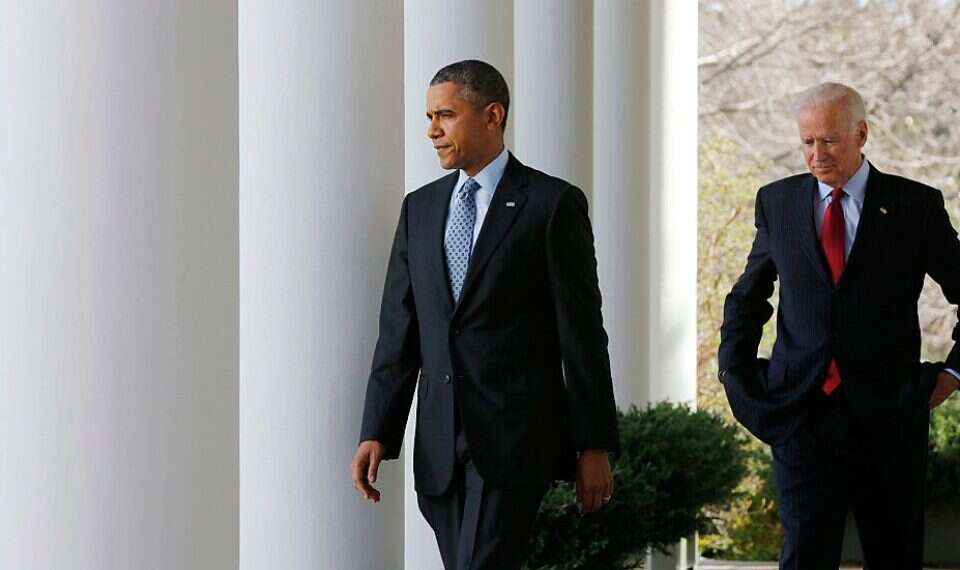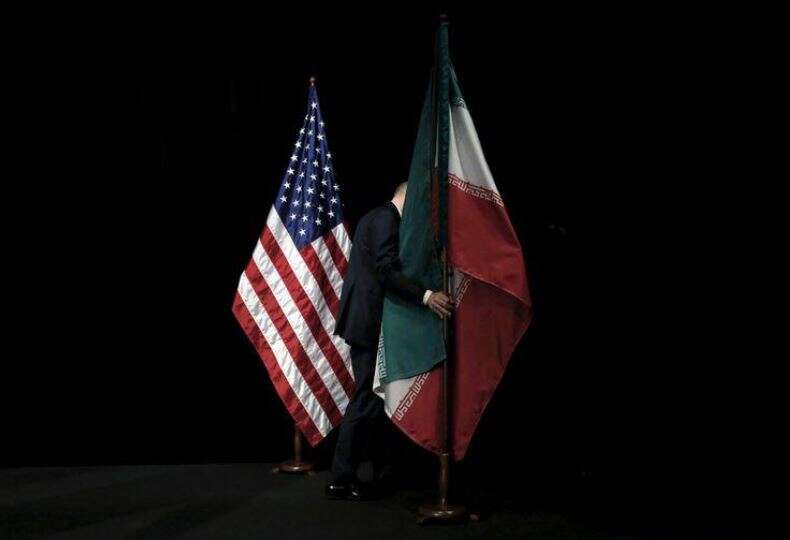by Jacob Nagel
To strike the Iranian problem from its to-do list, the US administration continues to offer concessions and other "goodies" in the hope of bringing Tehran back into the fatally flawed nuclear deal.
 |
| Then-US President Barack Obama walks next to Vice President Joe Biden at the White House in Washington, April 1, 2014 | File photo: Reuters / Larry Downing |
With the fighting in the Gaza Strip now over and the riots inside Israel coming to an end, we must not forget that in Vienna, nuclear talks between world powers and Iran, which is involved in all of Hamas' decision-making, including the rocket fire on Israel and the ceasefire – are ongoing. Iran provides Hamas with the funding, know-how, and technology necessary to build up its arsenal of advanced missiles, drones, naval weapons, and other ammunition, as well as carry out its various construction projects underground.
The United States is almost certainly about to repeat its past mistakes, as US President Joe Biden's administration is engaged in talks aimed solely at a return to the faulty 2015 nuclear deal. Talks are ongoing, but the final outcome is clear: a victory for Iran and a bad deal for the US, Israel, and their allies. US-Israel ties face a long, difficult path ahead, but as was the case with the ceasefire talks, both sides can and must come together to work out their differences.
Officials are following the Vienna talks, as well as discussions on a cessation of fighting in the south and the political instability that will determine the identity of Israel's prime minister, closely. Regardless of who is in charge, the government will need to work with a Democratic US government that ignores the advancement of an existential threat to Israel: a nuclear Iran. While this will make it very hard to focus on maintaining ties with Washington, this partnership is vital to both Israel and the US. How can this be achieved?

The first step is understanding what led to the current atmosphere in Washington. To strike the Iranian problem from its to-do list, the administration continues to offer concessions and other "goodies" to bring Tehran back into the deal despite the accord's fatal flaws and the fact that a return to the deal is in fact impossible given recent discoveries that were unknown at the signing of the deal as well as Iran's ongoing nuclear blackmail, evident in the significant advancement of its technological capabilities and blatant violations of the accord.
It seems that Biden and his team fail to understand their mistaken approach is bolstering Iran. With the understanding they have the upper hand, the Iranian negotiators are playing hard to get and issuing new demands at every stage of the negotiations. Tehran has even insisted Washington pay a premium for the "right" to remove sanctions and return to a deal that grants Iran a clear path to nuclear weapons.
By returning to the deal, the Iranians can install advanced centrifuges, advance their uranium enrichment capabilities, and wait for the accord to expire. Once 2030 comes to a close, there will no longer be any practical prohibitions on their ability to enrich uranium to weapons-grade levels, and the advanced centrifuge developed under the auspices of the accord will allow Iran to do so faster and in an even more hush-hush manner than before. The accord does not deal with the weapons system, and as a result, Iran's so-called "breakout" time for producing enough fissile material to make a nuclear weapon would be close to nonexistent.
America's allies are worried about its policies. Beyond the nuclear threat, the concern is what the world's No. 1 state sponsor of terrorism, which fuels Hezbollah, Hamas, the Houthis, and other terrorist groups, will do with the billions of dollars it is set to receive from Washington in the form of sanctions relief.
A return to the deal would make life difficult for Israel. How could it act with determination against Iran's nuclear program once it receives the legitimacy of a deal with the US? How would Washington respond if Israel were to take either covert or overt military action, given the fact that Israel did not accept the US demand for consultations upfront?
There is no doubt US-Israeli diplomacy and maximum transparency could help limit the damage. Senior Israeli officials, chief among them National Security Adviser Meir Ben-Shabbat and Mossad agency head Yossi Cohen, met with their US counterparts in Washington to present Jerusalem's concerns over Iranian policies while at the same time demanding the continuation and advancement of deep technological and intelligence cooperation.
On the Iranian front, the meetings concluded with both sides agreeing to disagree. The American objective was to drag the Israelis into a process and create the impression Jerusalem had accepted the US roadmap. The Israeli delegations were under clear orders to refuse to fall for the trap and declined to talk about a "longer and stronger" deal with Iran as long as a return to the nuclear deal was on the table.
'Israel will maintain freedom of action'
Israeli officials understand there will be no incentive for Tehran to return to the negotiating table once the deal has been restored and sanctions have been removed. Should Tehran prove Jerusalem wrong and agree to enter talks on a new deal, Israel will share the clauses it believes such a deal should include. No one in Israel, however, is holding their breath.
The delegation relayed the message Israel would not be bound by any agreement with Iran. Israel will maintain full freedom of action to prevent Iran from developing nuclear weapons by any means necessary. If a White House statement emphasizing the president's unwavering support for Israel's right to defend itself is any proof, Israel seems to have achieved its goal.
Israel has demanded US support for the completion of the International Atomic Energy Agency's investigation into Iranian violations and the publication of its findings regardless of whether or not both sides return to the 2015 deal. In 2015, a grave mistake was made when the investigation into the possible military dimensions of Iran's nuclear program despite its serious violations was closed. The nuclear archive and the IAEA's findings from its visits to Iranian nuclear sites proved Iran was much closer to obtaining a weapon than previously thought and had been concealing illegal nuclear documentation.
In the current round of talks, the Iranians appear to have absurdly requested all of the new investigations be closed, as was done in 2015. IAEA Dazhu Yang returned from Tehran with zero answers to questions regarding Iranian violations, in the expectation the US would yield on the issue once again.
Washington must not be allowed to prove they were right. Despite tensions between Jerusalem and Washington, Israel must explain why it cannot accept the concession. Failure to insist on full transparency from the IAEA in an effort to restore the nuclear deal would undermine the agency's very existence and the purpose of the deal: preventing Iran from obtaining nuclear weapons.
Despite their differences of opinion, Jerusalem and Washington must act to maintain their alliance. US support has always been bilateral and must remain so. Every opportunity must be found to deepen military, technological, and security cooperation to contend with common threats and work together to expand ties between Israel and additional Arab states.
Israel-US ties are approaching a challenging point, and hard work will be necessary to ensure they are maintained. Although unlikely, it would help if the Biden administration were to understand the mistake it made in the path it chose to take on Iran. At any rate, Israel must maintain its freedom of action on the issue, while at the same time, finding ways to maintain and bolster the important US alliance.
Brig. Gen. (Res.) Professor Jacob Nagel is a former national security adviser to the prime minister.
Source: https://www.israelhayom.com/2021/05/23/us-poised-to-make-the-same-mistake-twice/
No comments:
Post a Comment